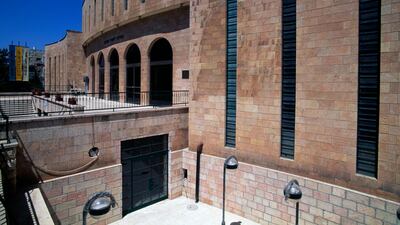Struggling with finances even before the Covid-19 pandemic, the LA Mayer Museum for Islamic Art in Jerusalem was due to sell more than 200 items from its collection, including rare Islamic antiquities, at a Sotheby’s auction in London on Tuesday.
The estimated value for the items was between £5.1 million ($6.6m) to £7.5m.
On Monday night, however, the museum announced that it would postpone the auction until November following a backlash from experts about the sale of cultural assets.
The selection of works included a 15th-century silver turban helmet adorned with intricate calligraphy and a rare calligraphic pottery ornament from Turkey, as well as a 13th-century Mamluk glass bowl and antique carpets from Egypt and Turkey. A number of watches, timepieces and music boxes were also due to be sold.
Among those who have criticised the auction were Israel’s President Reuven Rivlin and Israel’s culture ministry, with the latter attempting to stop the sale, claiming that the objects belong not to the museum, but the Hermann de Stern Foundation, a private entity that owns the items on the auction block and funds the museum’s operations.
“The foundation’s management hopes that the postponement will make it possible to reach agreements that will also be acceptable to the Culture Ministry in the coming weeks,” the Hermann de Stern Foundation said.
The museum was founded in the 1960s by Vera Bryce Salomons, a British-Jewish philanthropist from an aristocratic family.
She sought to put a spotlight on Arab culture and Islamic art as a way to build bridges between Palestinians and Jews in Jerusalem. Salomons named the museum after her friend Leo Aryeh Mayer, a scholar of Islamic art and archaeology.
In its collection, the institution has thousands of Islamic artefacts and objects, as well as unique timepieces, including a self-winding Breguet watch estimated at £20m and believed to have been a gift for Marie Antoinette. The watch was not included in the Sotheby’s auction.
Even before the pandemic, the museum had intended to sell items from its storeroom or collection to help it stay afloat.
Currently, it is unclear what items will remain on the auction block after discussions between the culture ministry and the museum. While the main page for the sale’s digital catalogue is still active on the Sotheby’s website, the auction house has taken down the specific pages for the lots, including the ones for the Ottoman helmet and Mamluk glass bowl.
A statement on the website states further details about the auction will be announced “in due course”.


